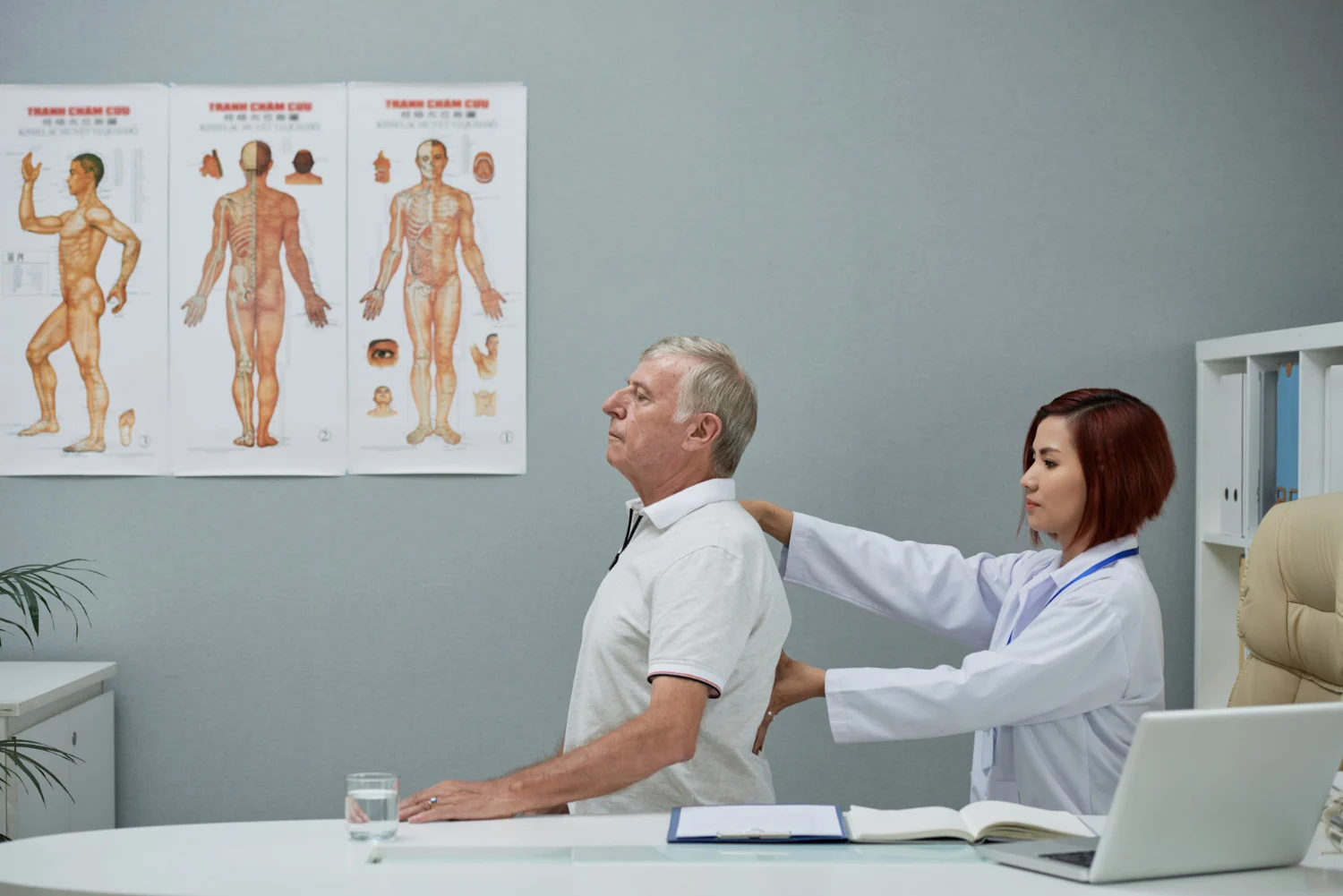Can Bad Posture Lead To Spine Problems?
Category: Orthopedics
Your posture is much more than just how you sit or stand—it plays a critical role in maintaining the health of your spine. Poor posture is one of the most common yet often overlooked causes of spine problems, leading to pain, discomfort, and long-term complications if left unaddressed. At Lokmanya Hospitals, one of the best hospitals for spine treatment in Pune, we have witnessed how posture directly impacts spinal health and overall well-being.
In this blog, we explore why maintaining good posture matters, how bad posture can lead to spine problems, and what you can do to correct it. Whether you’re struggling with chronic back pain or seeking to prevent future issues, this guide will help you understand the connection between posture and spinal health.
What Is Posture and Why Does It Matter?
Posture refers to the position in which you hold your body while standing, sitting, or lying down. Good posture means maintaining the natural curves of the spine—cervical (neck), thoracic (upper back), and lumbar (lower back)—in alignment. This balance allows your muscles, ligaments, and joints to work efficiently, minimizing strain and wear.
In contrast, bad posture involves positions where these curves are exaggerated or flattened. Common examples include slouching, hunching forward, or leaning to one side. Over time, these habits can disrupt the spine’s alignment and increase stress on spinal structures.
How Does Bad Posture Affect the Spine?
The spine is a complex structure composed of vertebrae, intervertebral discs, muscles, ligaments, and nerves. When posture is poor, it creates an uneven distribution of weight and pressure on the spine, which can cause a cascade of problems:
1. Increased Pressure on Spinal Discs
Poor posture compresses the intervertebral discs unevenly, especially in the lumbar and cervical regions. This increases the risk of herniated or bulging discs, where the soft disc material presses on nearby nerves, causing pain, numbness, or weakness.
2. Muscle Strain and Imbalance
Bad posture forces certain muscles to work harder to support the body, leading to muscle fatigue and tightness. For example, slouching often tightness chest muscles while weakening the upper back muscles, creating an imbalance that pulls the spine out of alignment.
3. Joint Stress and Degeneration
When the spine is misaligned due to poor posture, the facet joints that connect vertebrae bear excessive load. Over time, this can accelerate degenerative disc disease and arthritis, causing chronic pain and reduced mobility.
4. Nerve Compression
Misalignment or disc herniation caused by poor posture can compress spinal nerves, resulting in symptoms like sciatica, radiating pain, tingling, or numbness in the arms or legs.
5. Reduced Lung Capacity and Organ Function
Slumped posture, especially in the thoracic region, restricts the chest cavity, reducing lung capacity and impairing breathing. This can affect overall health and energy levels.
Common Spine Problems Caused by Bad Posture
Here are some specific spine conditions linked to poor posture habits:
- Kyphosis: Excessive rounding of the upper back (hunchback), often caused by prolonged slouching.
- Lordosis: Excessive inward curve of the lower back, sometimes related to weak core muscles.
- Scoliosis: Abnormal sideways curvature of the spine, which can worsen with imbalanced posture.
- Chronic Back and Neck Pain: Persistent pain due to muscle strain and joint stress.
- Disc Herniation and Spinal Stenosis: Compression of nerves due to poor alignment and disc damage.
Who Is at Risk?
Bad posture and spine problems can affect anyone, but certain groups are more vulnerable:
- Office workers: Long hours of sitting, often with poor ergonomics, increase risk.
- Students: Heavy backpacks and poor sitting habits contribute to spinal stress.
- Older adults: Age-related muscle weakness and disc degeneration worsen posture.
- People with sedentary lifestyles: Lack of physical activity weakens supporting muscles.
How to Prevent Spine Problems Caused by Bad Posture
The good news is that most posture-related spine problems can be prevented or improved with conscious effort and professional care. Here are effective strategies:
1. Practice Proper Posture Daily
- Sit with your back straight and shoulders relaxed.
- Keep feet flat on the floor.
- Use ergonomic chairs and desk setups.
- Align your head with your spine; avoid forward head posture.
2. Strengthen Core and Back Muscles
Regular exercise focusing on core stability helps support the spine and maintain correct posture. Activities like Pilates, yoga, and targeted physiotherapy can be beneficial.
3. Take Frequent Breaks
If your work requires prolonged sitting, stand, stretch, and walk every 30–60 minutes to relieve spinal pressure.
4. Use Proper Lifting Techniques
Avoid bending at the waist; instead, bend your knees and keep objects close to your body.
5. Get Professional Assessment
Early diagnosis by spine specialists can help correct posture before complications arise. Lokmanya Hospitals offers comprehensive posture assessments and personalized treatment plans.
How Lokmanya Hospitals Can Help
At Lokmanya Hospitals, we focus on a holistic approach to spine health. Our dedicated Spine Care Unit combines expert diagnosis, posture correction therapies, advanced imaging, and minimally invasive treatments. Whether you need relief from chronic pain or want to prevent spine problems caused by bad posture, our team of neurosurgeons, orthopedic specialists, and physiotherapists are here to guide you.
We create personalized rehabilitation programs that include posture training, muscle strengthening, and lifestyle advice to ensure lasting spinal health.
Conclusion
Bad posture is more than just an aesthetic issue—it’s a serious risk factor for a variety of spine problems that can affect your quality of life. By understanding the impact of posture on spinal health and adopting preventive measures, you can protect your spine from pain, injury, and degeneration.
If you experience persistent back or neck discomfort, don’t ignore it. Early intervention at a specialized center like Lokmanya Hospitals, renowned as one of the best hospitals for spine treatment in Pune, can make all the difference in recovery and prevention.
FAQs
Q1: Can poor posture cause permanent spine damage?
Yes, chronic poor posture can lead to structural changes like disc degeneration and spinal curvature, which may become permanent without intervention.
Q2: How long does it take to correct bad posture?
With consistent practice and professional guidance, noticeable improvements can occur within weeks to months depending on severity.
Q3: Are there exercises I can do at home to improve posture?
Yes, exercises like chin tucks, shoulder blade squeezes, and core strengthening moves are effective. However, consulting a physiotherapist for a personalized plan is recommended.
Q4: Can bad posture cause nerve pain?
Yes, misalignment from poor posture can compress spinal nerves, leading to pain, tingling, or numbness.
Q5: Do Lokmanya Hospitals offer posture correction treatments?
Absolutely. Our spine specialists provide comprehensive posture assessments and customized rehabilitation programs.

Dr. Pallav Bhatia
- M.B.B.S. and specialization in Orthopedics
Consultant Spine Department
Previous blog

What Is A Spine Problem?
Next blog






